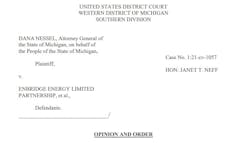Enbridge wins ruling to keep Line 5 fight in federal court
A federal judge ruled Aug. 18 that the Michigan government’s fight to shut down Enbridge Inc.’s Line 5 pipeline must remain in federal court.
It was the second time in less than a year that Judge Janet Neff of the US District Court for the Western District of Michigan has ruled against state plaintiffs fighting the 540,000 b/d pipeline, which carries crude oil and propane under the Straits of Mackinac between Michigan’s Upper Peninsula and the rest of the state.
The case, Nessel v. Enbridge Energy LP, was launched in state court by Michigan Attorney General Dana Nessel but then removed to federal court on a motion by Enbridge. The state plaintiff asked the federal court to remand the case back to state court based in part on a procedural technicality—a time limit on when a case normally can be removed to federal court.
The judge said the time limit was not a strict matter. This case, she said, turns primarily on jurisdiction and the “equitable administration of justice.”
As for jurisdiction, the judge agreed with Enbridge in a parallel case that substantial federal interests were involved and should be decided in federal court. Having reached that conclusion in the parallel case with a decision Nov. 16, the judge reinforced it Aug. 18 in the Nessel v. Enbridge case.
“The court will not accept the state’s invitation to undermine its previous decision and perpetuate a forum battle,” the judge wrote in her opinion. “It would be an absurd result for the court to remand the present case and sanction a forum battle.”
Federal interests
The federal interests as listed by Enbridge are several: the Constitution’s Supremacy Clause, giving federal law primacy in conflicts with state law; the Constitution’s Interstate Commerce Clause as it relates to an interstate and international pipeline; the federal Pipeline Safety Act, regulating safety of an interstate oil pipeline; and a 1977 agreement between the US and Canada concerning transit pipelines.
The Canadian government invoked the 1977 treaty when it formally entered the dispute in 2021 (OGJ Online, Oct. 5, 2021).
Because Michigan has tried to win a Line 5 shutdown through more than one lawsuit over the same subject at the same time and has been sued in turn by Enbridge, the judge said it would be better for the cases to be decided together in the same federal forum to avoid duplicative labor and inconsistent results.
Michigan Gov. Gretchen Whitmer said during her election campaign in 2018 that shutdown of Line 5 was one of her goals. She is running for reelection this year.
Enbridge has filed a plan to build a tunnel under the Straits of Mackinac to give Line 5 a safer crossing. The line has operated for about 69 years with a crossing on the bed of the straits, not beneath the bed. The line serves 10 refineries to varying degrees, in Michigan, Ohio, Pennsylvania, Ontario, and Quebec, according to the operator.
The US Army Corps of Engineers is conducting an environmental impact statement (EIS) on the tunnel plan. Earlier this year the Corps said the EIS would take about 2 years to complete. If all state and federal approvals are received, the construction of the tunnel could start in 2024 and is intended to be completed in 4 years, which could mean 2028, barring delays.
About the Author
Alan Kovski
Washington Correspondent
Alan Kovski worked as OGJ's Washington Correspondent from 2019 through 2023.
